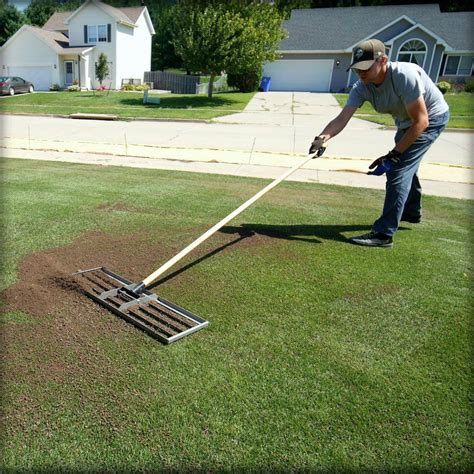How To Level A Field
Ronan Farrow
Apr 01, 2025 · 3 min read

Table of Contents
How to Level a Field: A Comprehensive Guide
Leveling a field is a significant undertaking, whether you're preparing for a lawn, garden, or construction project. It requires careful planning and execution, but the result is a beautifully flat and functional space. This guide will walk you through the process, from initial assessment to final touches.
1. Assess Your Field and Define Your Goals
Before you grab a shovel, take time to assess your field. This crucial first step will determine the tools and techniques you'll need.
1.1 Determine the Extent of Unevenness
How uneven is your field? Is it slightly bumpy, or are there significant slopes and dips? A gentle slope might only require topdressing, while a heavily undulating field might demand more extensive earthmoving. Walk the area, noting high and low points. You can use a level or even a simple garden hose stretched taut to gauge the differences in elevation.
1.2 Define Your Desired Use
The intended use of your leveled field will heavily influence the precision needed. A playing field requires a higher level of accuracy than a simple garden. This informs your tolerance for remaining unevenness and choice of leveling methods.
1.3 Consider Drainage
Proper drainage is crucial to prevent waterlogging and soil erosion. Plan your leveling to ensure water flows away from structures and sensitive areas. Consider the natural slope of the land and incorporate swales or ditches if necessary.
2. Choosing Your Leveling Method
The best leveling method depends on the size of your field, the degree of unevenness, and your budget.
2.1 Manual Leveling (Small Areas)
For small, relatively level areas, manual leveling using shovels, rakes, and hand tools may suffice. This is labor-intensive but cost-effective. It's ideal for fine-tuning after using other methods.
2.2 Mechanical Leveling (Larger Areas)
For larger fields with significant unevenness, mechanical leveling is necessary. This could involve renting or hiring equipment such as:
- Box Scrapers: These are excellent for smoothing large areas and removing high spots.
- Bulldozers or Excavators: These are powerful machines used for large-scale earthmoving, best suited for significant grading projects.
- Laser Levelers: For highly precise leveling, laser-guided equipment provides accurate grading over large areas.
3. The Leveling Process
This step-by-step guide provides a general outline. The specific steps may vary depending on your chosen method.
3.1 Clearing the Area
Remove any debris, rocks, or vegetation from the field. This ensures a clean and uniform surface for leveling.
3.2 Establish a Baseline
Determine your desired level using stakes and string or a laser level. This establishes a reference point for the entire leveling process.
3.3 Grading and Shaping
Begin moving earth to reach your desired level. Start by removing high points and filling low areas. Use the chosen leveling method to achieve a consistent surface. Work in sections for better control and to minimize errors.
3.4 Compaction
After grading, compact the soil to prevent settling and ensure a stable surface. This can be done manually with a tamper or using a heavy roller.
3.5 Topdressing (Optional)
For a smoother finish, consider applying a layer of topsoil or other suitable material. This improves the soil quality and provides a uniform surface for planting or other uses.
4. Final Touches and Maintenance
After leveling, take time for final checks and adjustments. Ensure proper drainage, and address any remaining inconsistencies. Regular maintenance, including mowing (for lawns) and weed control, will help maintain the level of your field over time.
Conclusion: A Level Playing Field
Leveling a field might seem daunting, but with careful planning and execution, you can achieve a flat and functional area for your desired purpose. Remember to prioritize safety, choose the right tools and techniques for your project, and enjoy the satisfaction of a job well done!
Featured Posts
Also read the following articles
| Article Title | Date |
|---|---|
| How To Mount A Fishfinder On An Aluminum Boat | Apr 01, 2025 |
| How To Make A Gopher Blaster | Apr 01, 2025 |
| How To Hang Candles From The Ceiling | Apr 01, 2025 |
| How To Prevent Furnace Exhaust From Freezing | Apr 01, 2025 |
| How To Make Mustang Grape Wine | Apr 01, 2025 |
Latest Posts
-
Does Howes Diesel Treatment Go Bad
Apr 03, 2025
-
Does Howes Diesel Treat Go Bad
Apr 03, 2025
-
Do I Have To Know How To Swim To Snorkel
Apr 03, 2025
-
Divorce In Nyc How Long
Apr 03, 2025
-
Dinosaurs How They Lived And Evolved 3rd Edition
Apr 03, 2025
Thank you for visiting our website which covers about How To Level A Field . We hope the information provided has been useful to you. Feel free to contact us if you have any questions or need further assistance. See you next time and don't miss to bookmark.
